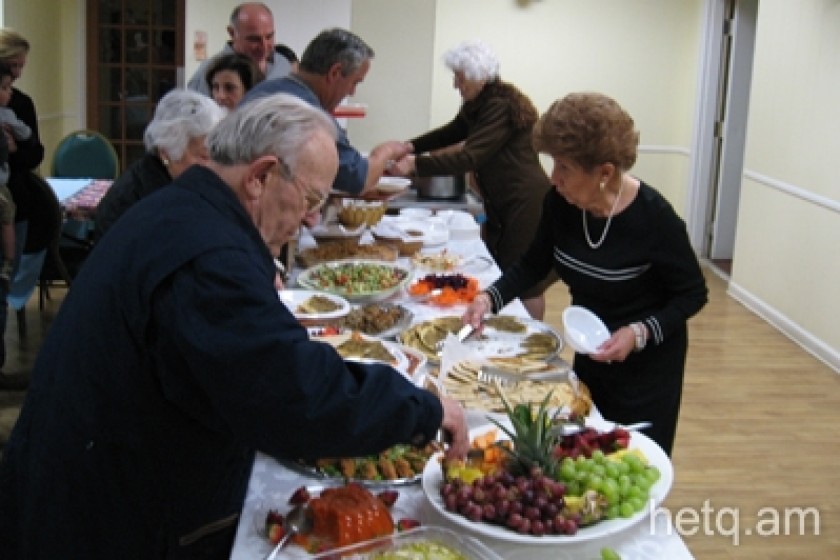
Rubbing Shoulders at an Armenian Church Dinner in Washington, D.C.
This reporter talks to a few diaspora Armenians about their impressions of life in Armenia
I was recently in Washington, D.C., a sort of intern with a U.S. State Department program called the “International Visitor”. While in the nation’s capital I had a chance to visit St Mary’s Armenian Apostolic Church.
Every Wednesday, the church holds a dinner for local Armenians and guests. A church committee gets together and decides on the menu and other details; like who’s going to cook all that food.
Guests pay a symbolic fee of $5 for the buffet type dinner. I decided to pay a visit one Wednesday evening. What follows are a few impressions.
We Armenians from the RA are used to the fact that guests, traditionally, are placed at the head of the table and looked after more than others. The three of us from Armenia who went to the diner were practically overlooked. No one came up to greet us or even say hello.
People showed up, ate, and then left. I mean there was nothing “Armenian” about the dinner. Sure there were some who spoke Armenian and claimed they attended church regularly as a way to remain Armenian, but that’s it. Maybe I shouldn’t have expected anything more.
Luckily I did start a conversation with a woman called Doris Hagopian. She attends the dinners every Wednesday and goes to church every Sunday. She is 74 years old. Back in Armenia we’d address a woman that age as “tatik” (grandma) but I didn’t dare call Doris that. I mean she was preparing the table and playing with the children in the hall. Then too, she was all made up to look like a much younger woman. Nah, I couldn’t call her granny.
Doris has been living in the States for 40 years. She’s originally from Alexandria, Egypt. She first visited Armenian in 2004 as one in a group of five. She spent two weeks in Armenia and three days in Artsakh.
“Yerevan was amazing. Given the Soviet era, I figured everything would be backwards, but there was progress. The poverty in the villages was somewhat disheartening. But it’s like that in every country, even in a rich country like America. Karabakh impressed me the most,” said Doris in her colloquial western Armenian.
Back then her husband also wanted to visit Armenia but had health issues. She returned in 2006 but this time on another mission.
“My husband always wanted to see Armenia. When he passed away that year I went and scattered his ashes in the waters of Lake Sevan,” Doris recounted.
She loved Armenia but said that at her age she could never move there, noting that she too had health issues. During our conversation she also mentioned the real reason.
“We live in other conditions here. There is health insurance if we need help. I fell while in Armenia and injured my thumb. The nurse shot me with a pain killer. Others chastised me saying that something worse could have happened as a result of the needle. Another doctor was with us and said that the needle might have been used more than once. Yeah, there’s a degree of uncertainty there. I wasn’t concerned but that doctor made me wonder a bit.”
She said that she didn’t agree with those living outside Armenia who only have negative things to say about the country.
“I guess it’s a result of the Soviet regime that there’s not enough progress as there should be. But things have really taken off in the past twenty years. When I returned in 2006, I saw all the new buildings and all. I think it’s a good thing,” said Doris Hagopian.
Doris confesses that she doesn’t know much about Armenia. One of the reasons is that she doesn’t have a satellite dish to watch Armenians TV stations. It costs too much, she argues. But when she hears negative coverage about Armenia or Armenians on the other stations, it causes her pain. She also feels pain when the talk is about opening the border between Turkey and Armenia.
“I don’t understand it. Are we to forget all the bad things done by the Turks just to get rich?”
In 2006, Nora Mehrabian came to Armenia for the first time with Doris. Nora is 76years-old and was born in Greece. She’s been living in the States for the past 46 years.
“Yerevan was a bit like Athens. I really liked Armenia. The city was nice but the outskirts were very poor. That’s why I have become a sponsor for a few young children. It makes me feel good that I can help out a bit,” said Nora.
She sponsors two children in a village she had visited and sends money a few times a year.
“When I was young, the family wanted to repatriate to Armenia, but we couldn’t. Armenia is always on our mind and we are filled by the Armenian spirit. And don’t forget that we have to remain Armenian to keep this church going,” said Mrs. Nora.
She was also a human dynamo, full of vigor. Nora told me that she remains active in Armenian affairs.
“Every April 24 I go to the Turkish embassy with a banner in my hand. Even at my age, I still get out there and do it with all my heart.”
 Videos
Videos Photos
Photos
Comments (1)
Write a comment